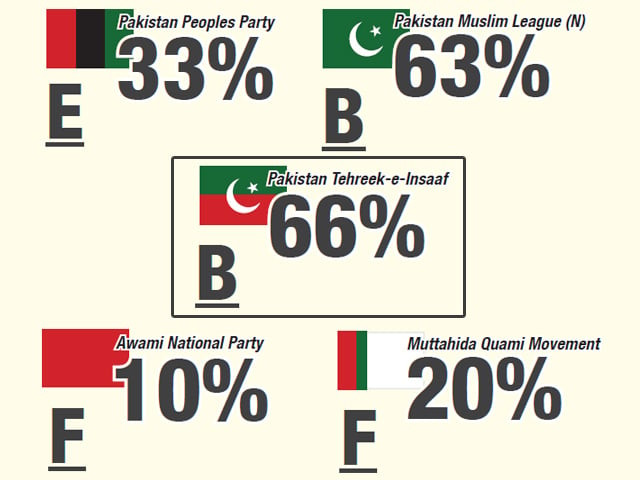Grading the manifestos: PML-N and PTI prioritise economy in their political agendas
Some parties ignore vast swathes of economic management altogether.

Our aim in this special report is to examine how much each political party has thought about the economy. DESIGN: JAMAL KHURSHID/ SAMRA AAMIR
Manifestos in Pakistani elections are treated by most political parties as homework: a dreaded chore that must be done before they can be allowed to go play the electoral game they enjoy so much. The homework usually gets done, but its quality is often left unexamined, and is therefore uncertain. With just days left to the election, we at The Express Tribune have taken the liberty of grading these manifestos.
Our aim in this special report is to examine how much each political party has thought about the economy. We recognise that parties rarely fulfil all the promises they make in manifestos, or even come close. But the documents are nonetheless useful and deserve to be examined: they reflect whether or not the parties even have an understanding of the challenges they face, should they be entrusted by the voters with the responsibility of actually governing the nation.
Our focus on the economy has meant that this special report focuses not on the entirety of the manifestos, but only on their sections most closely related to the economy. Hence, for example, we omit sections on civil rights, education, and health. Each of these things has an indirect impact on the economy, particularly education, but there are other considerations to each that are not strictly economic.
We have adopted a methodology inspired in part by an analysis of manifestos done by the Pakistan Business Council, a think-tank/lobbying group. But the criteria we have used are somewhat different from those used by the PBC. Like the PBC, we emphasise energy above most other segments, believing that no government will be able to fulfil any part of its agenda unless it first confronts the now-chronic energy crisis.
Broadly speaking, we have identified four categories that we believe are most important: energy, fiscal responsibility, reducing regulatory hurdles (which includes global trade), and improving government efficiency. Within each, we have graded each party on five or six separate criteria, with each grade representing the level of detail and specificity that a party is willing to offer on any given criterion.
Our methodology is, of course, subjective and therefore open to debate and dispute on any given criterion we chose to utilise (or others that we chose not to use). Nonetheless, while the individual bits of our analysis may be debatable, our overall conclusion seems to be on par with most other analysts: the Pakistan Tehreek-e-Insaf (PTI) and Pakistan Muslim League-Nawaz (PML-N) pay the most attention to the economy, with the Pakistan Peoples Party a distant third and the other parties so far behind as to not even merit mention.
In our grading, the PTI comes out slightly ahead. But lest the Insafians get ahead of themselves, we would like to introduce a caveat: the difference with the PML-N is so minor that neither can claim definitive superiority over the other, unless the debate acquires a distinct ideological bent.

Our analysis focused only on the three major national parties and two of the most important regional ones: the Awami National Party (ANP) and the Muttahida Qaumi Movement (MQM). It is perhaps unfair to compare the regional parties to national ones, but both of these parties are particularly keen to cast themselves as national-parties-in-waiting, and so we felt comfortable including them.
The analysis, however, does not present either in a favourable light. Both ANP and MQM got bad grades on the economic segments of their manifestos. Perhaps they should pay a little more attention to their homework.
Published in The Express Tribune, May 6th, 2013.
Like Business on Facebook to stay informed and join in the conversation.



















COMMENTS
Comments are moderated and generally will be posted if they are on-topic and not abusive.
For more information, please see our Comments FAQ